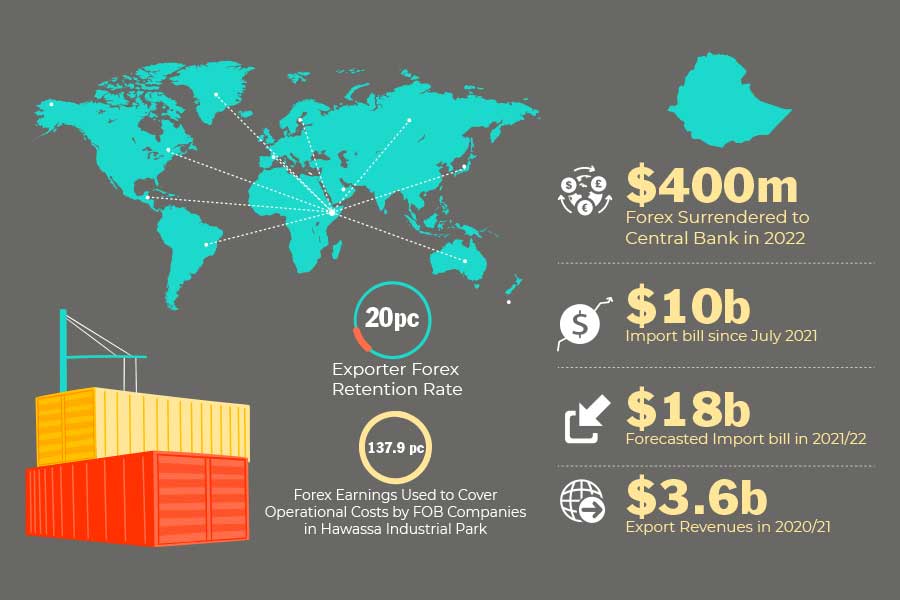
Commentaries | Dec 04,2021
Exporters have been barreling through from obstacle to disaster over the past decade, not unlike most other sectors. Things have only gotten worse over the last two years, starting from the economic impacts of the COVID-19 pandemic. Now, the headache is coming from the National Bank of Ethiopia (NBE), which recently ordered exporters to surrender four-fifths of all the foreign currency they earn. An overwhelming share goes into the central bank's coffers at 70pc, amounting to 400 million dollars over the past two months. Another 10pc is retained by the commercial banks where the exporters have accounts. Close to 10pc of the forex goes to cover freight costs.

Exporters have misgivings, albeit muted, over the amendment to retention rules, the third in about a year. The consequence, some of them told Fortune, would be to discourage the export business, which is critical to the health of the balance of payments. Moreover, it restricts foreign currency cash flow needed to import essential inputs for production. This is especially the case for exporters in input-intensive industries, such as horticulture and textiles, unable to substitute with domestic supplies due to quality issues. The two sectors earn foreign currency that covers 17pc of the 3.6 billion dollars generated from exports last year. Despite exporters' compunctions, the retention rules are here to stay as the federal government struggles to cover costs for importing essential items such as medicine, fuel, fertiliser and wheat. It also has the burden to settle external debt instalments. Some experts suggest that exporters should be allowed to retain all the hard-earned foreign currency they bring in, benefitting the sector and growing the overall pie through incentivisation. Others advise that exporters consider importing inputs through letters of credit (LC), in addition to the 20pc foreign currency they are allowed to retain. Unfortunately, the queues to obtain permits for letters of credit are too long and could take months or even years before they are approved.
Exporters will have to fend for themselves in the meantime or cease operations. Industry operators warn that they are a few months away from closing up shop.
You can read the full story here
PUBLISHED ON
Mar 05,2022 [ VOL
22 , NO
1140]

Commentaries | Dec 04,2021

Commentaries | Dec 19,2021

Radar | May 07,2022

Fortune News | May 28,2022

Sponsored Contents | Apr 05,2022

Fineline | Oct 03,2020

Fortune News | Jul 11,2021

Fortune News | May 23,2021

Fortune News | Oct 16,2021

Viewpoints | Oct 02,2021

Dec 22 , 2024 . By TIZITA SHEWAFERAW
Charged with transforming colossal state-owned enterprises into modern and competitiv...

Aug 18 , 2024 . By AKSAH ITALO
Although predictable Yonas Zerihun's job in the ride-hailing service is not immune to...

Jul 28 , 2024 . By TIZITA SHEWAFERAW
Unhabitual, perhaps too many, Samuel Gebreyohannes, 38, used to occasionally enjoy a couple of beers at breakfast. However, he recently swit...

Jul 13 , 2024 . By AKSAH ITALO
Investors who rely on tractors, trucks, and field vehicles for commuting, transporting commodities, and f...

Oct 25 , 2025
The regulatory machinery is on overdrive. In only two years, no fewer than 35 new pro...

Oct 18 , 2025
The political establishment, notably the ruling party and its top brass, has become p...

Oct 11 , 2025
Ladislas Farago, a roving Associated Press (AP) correspondent, arrived in Ethiopia in...

Oct 4 , 2025
Eyob Tekalegn (PhD) had been in the Governor's chair for only weeks when, on Septembe...